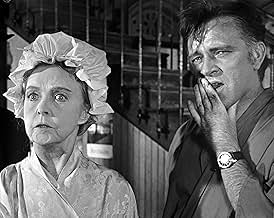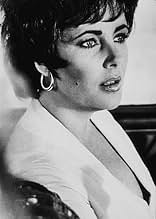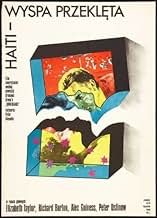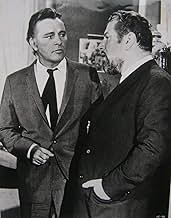Um cínico dono de hotel galês tem um romance secreto com a esposa de um diplomata no Haiti, sob o reinado violento do déspota "Papa Doc" Duvalier.Um cínico dono de hotel galês tem um romance secreto com a esposa de um diplomata no Haiti, sob o reinado violento do déspota "Papa Doc" Duvalier.Um cínico dono de hotel galês tem um romance secreto com a esposa de um diplomata no Haiti, sob o reinado violento do déspota "Papa Doc" Duvalier.
- Prêmios
- 3 vitórias e 1 indicação no total
- Haitian Soldier
- (não creditado)
- Haitian Soldier
- (não creditado)
- Angelito Pineda
- (não creditado)
- César
- (não creditado)
Avaliações em destaque
"I have no faith in faith," rants Brown (Burton) the anti-hero of the film--a typical Greene character (compare with Greene's 'The Burnt-out case'). Cynicism is turned into comedy. The splashes of Catholic motifs made in passing reference ("defrocked priest") hark back to Burton's earlier role in "Night of Iguana." Guinness' reference to looking like a "Lawrence of Arabia" recalls his own role as Prince Faisal in Lean's movie. Not having read Greene's book, I am not sure whether Greene introduced these clever details into the script to suit the actors or whether the details had previously existed in the book.
The gradual unmasking of the Major (Guinness) is a treat creatively captured by Glenville and Greene. The final speech made by Burton to his group of ragged rebels seem to have a common "comic" thread with George Clooney's speech to his soldiers towards the end of the recent Mallick's "The Thin Red Line".
Ustinov's diplomat and Taylor's vulnerable diplomat's wife, who admits to her lover that he is the fourth "adventure," are both comedians--Greene's likable misfits who cannot change their destiny and are strangely reconciled to accept their inevitable end. All the four main characters are "prepared" for their destiny they have designed for themselves as a consequence of previous actions in life. The closing shot of the film is a shot of a suggestive blue sky, redeeming the foibles of the comedians on terra firma.
I admit that when I saw the film some 20 years ago, I did not appreciate the film as I do now. I was missing the forest for the trees. This film does not belong to Burton, Taylor, Guinness, Ustinov, Jones or Lillian Gish. It belongs to Greene, Glenville and the French cinematographer Henri Decae.
I do not imply that Burton was not good--but George C Scott said one should evaluate a performance by remembering the character more than the actor. It is in that context that I remember the four main characters. Burton's kisses are different here than say in "Boom" or "Cleopatra"--only to add detail to the character. Taylor is strangely subdued only to add power to her smoldering role. Guinness gradual unmasking is pathetic yet endearing only to add more substance to the character. Decae's camera captures details that shocks--e.g., empty drawers in desks to collect bribes, public executions of rebels watched by school kids...
I am surprised that this film, to my limited knowledge, has never been taken seriously for what it offers--a superb script, commendable acting, good direction, and some fine camera-work.
The title from the original Graham Greene novel refers to the various white people here who are very different, but who handle what they see in Haiti by making a lot of bad jokes. Whatever else this is, The Comedians is not a comedy.
Burton and Taylor play the owner of a hotel in Port-Au-Prince and she is the wife of an ambassador from some foreign country unnamed. They're having an affair, she's married to Peter Ustinov. Paul Ford and Lillian Gish are a husband and wife and he once ran for president on the Vegetarian Party ticket. He wants to start a business, a vegetarian resort of sorts. These two are totally clueless, but so are the Haitians they deal with, they actually treat Ford like a big deal.
Alec Guinness plays a part similar to the part David Niven had in Separate Tables, he's an arms dealer who's been dealing with someone now out of favor with the regime. But while at first he's clapped in prison Guinness makes a deal with another faction who think he's a big deal with his heralded background of being a war hero in the Burmese campaign in World War II. If you've seen Separate Tables than you can equate Guinness with Niven.
These name players however take a back seat to some of the black performers in The Comedians. Roscoe Lee Browne, Cicely Tyson, Gloria Foster, Georg Stanford Brown all are different types of Haitians from different levels of society there. But the guy to really watch is Raymond St. Jacques. As a captain in Duvalier's police he is one truly malevolent being. St. Jacques steals all the scenes he's in.
Of course Papa Doc didn't allow The Comedians to be shot in Haiti, but the country of Dahomey one of the new African Republics served well as a place with a poverty level similar to Papa Doc's little satrapy. The Comedians which was not a big hit at the time is maybe more relevant today as we can see things there without the filter of the Cold War between two superpowers.
Liz and Dick did a good one here, one for the ages.
Graham Greene does a respectable job of paring down his complex novel for the screen, and director Glenville keeps the film moving at a reasonable pace in spite of its lengthy runtime of 150 minutes. The film is always interesting and occasionally gripping, although Greene and Glenville keep the audience at a relative distance which prevents the picture from striking as hard as it could have. Burton is in good form, and Alec Guinness, Paul Ford, and Lillian Gish all turn in top notch support (only Peter Ustinov feels under utilized). Unfortunately, Taylor is dreadfully miscast as a German military wife complete with a woefully unconvincing accent and her ill-fitting presence creates several lulls in the film as the number of scenes between her character and Burton's character are increased (in order to give the diva her proper screen time) which hampers a few long stretches of the film and slightly undermines what could have been a first-rate effort.
The great storyteller that he was, Graham Greene must have woven the elements of this story together very well in his novel. But here we have two big separate stories butting heads with one another. The first is the adulterous love affair between the two leads, Richard Burton as Brown and Elizabeth Taylor as Martha. The second is the plight of the people of Haiti living in a constant state of terror under the ruthless Duvalier and his henchmen. But then, two other elements that Greene no doubt worked into his single story, here appear to be separate stories awkwardly sandwiched into the two main stories. They are the businesses of Major Jones, played by Alec Guinness, and of Smith, played by Paul Ford. The end result is a plot with many subplots – all poorly connected.
Besides the leads, the film has several stellar actors. Guinness and Ford are joined by Peter Ustinov as Ambassador Pineda, Lillian Gish as Mrs. Smith, and James Earl Jones as Dr. Magiot. A handful of others in the supporting cast also give good performances in the film.
The direction and editing are weak. The cinematography is good and the location does a good job showing the scenery and conditions as they might have been in Haiti from the late 1950s through most of the 20th century. But for that historical connection and the performances of the supporting cast, this film is hardly worth watching. At the end of the movie, it seemed to me that I had been watching a belabored story about a sex-driven but frustrated white hotel owner in Haiti who couldn't find fulfillment in anything he did.
Movie fans who enjoy history may find Duvalier's story interesting. He was a physician who treated the poor and suffering people of Haiti in his early life. That's where he got his endearing moniker from the people, "Papa Doc." He was elected president in a free open election in 1957. But he soon became crazed with power. He killed 30,000 of his countrymen and established a reign of fear and terror, while the poor of his country suffered all the more.
Set during the time of Papa Doc, the story centers on Richard Burton as the white owner of a hotel left to him by his mother. He is in love with the wife (Elizabeth Taylor) of an ambassador (Peter Ustinov) and has managed to remain apolitical. However, events force him to enter the fray.
The Comedians holds one's interest, although it's on the long side. The cast is remarkable: Burton, Alec Guinness, Peter Ustinov, Taylor, James Earl Jones, Lillian Gish, Georg Stanford Brown, Roscoe Lee Brown, and, in a small role, Cicely Tyson.
Taylor is very beautiful, although her accent is all over the place. She sounds French in the beginning, then English, then like Elizabeth Taylor, and then in the middle of the movie, we find out she's German.
Though Burton went the schlock for cash route in his career, he was a wonderful, handsome actor with a remarkable voice. Towards the end of the film, he has a scene with Guinness that is well worth the wait - two great actors in a subdued and remarkable scene.
The Haitian scenery belies what lies underneath. It's a film that is perhaps more timely today than it was in 1967.
Você sabia?
- CuriosidadesSeveral critics noted that the ending of this movie is at least a little more positive and optimistic than the bleak ending of Graham Greene's original novel, and attacked the movie for "softening" the subject. Greene, however, insisted that the more upbeat ending had been his own idea.
- Erros de gravaçãoIn the last few shots in the movie, as Petit Pierre (Roscoe Lee Browne) is leaving the airport, there is initially a departing Vickers VC10 airliner flying overhead from right to left, this changes to a close up, followed by a shot of the same airliner now flying into the distance - unfortunately this is different 4 engine Jetliner.
- Citações
Brown: I don't believe in causes.
Dr. Magiot: The role of cynic doesn't really suit you, Brown.
Brown: I don't believe in play-acting either.
Dr. Magiot: You imagine because you've lost one faith, you've lost all? You're wrong, Brown. There is always an alternative to the faith we lose.
Brown: I have no faith in faith.
- ConexõesFeatured in The Comedians in Africa (1967)
Principais escolhas
- How long is The Comedians?Fornecido pela Alexa
Detalhes
- Data de lançamento
- Países de origem
- Idiomas
- Também conhecido como
- The Comedians
- Locações de filme
- Empresas de produção
- Consulte mais créditos da empresa na IMDbPro
Bilheteria
- Faturamento bruto nos EUA e Canadá
- US$ 5.200.000
- Tempo de duração
- 2 h 30 min(150 min)
- Mixagem de som
- Proporção
- 2.35 : 1























